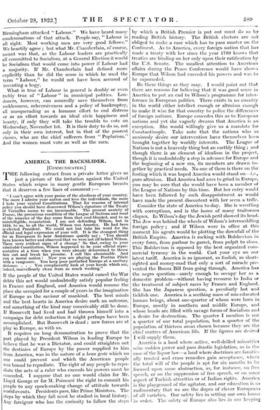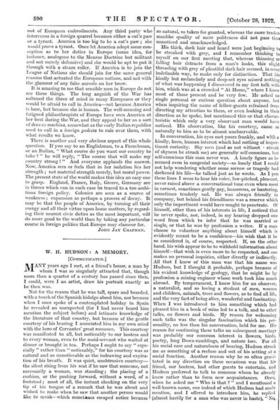AMERICA THE BACKSLIDER. [COMMUNICATED.] T HE following extract from a private
letter gives so just a picture of the irritation against the United States which reigns in many gentle European breasts that it deserves a few lines of comment :— " I can't agree with your praise of the aloofness of your country. The more I admire your nation and love the individuals, the more I hate your cynical Constitutions. That for reasons of internal policy you should have disavowed Wilson's signature of the Treaty of Versailles seems to me inexcusable. The present anxiety of France, the precarious condition of the League of Nations and most of the miseries of the day come from that cool-blooded, and to us unintelligible, recantation. I am not defending Wilson, but in 1918, to us, to all the world, Wilson was America. He had been re-elected President. We could not but take his word for the Official and legal expression of your will. It is the strangest thing for us Europeans to hear Americans quietly say : ' You should have known better and observed that we were not all behind Wilson. There were evident signs of a change.' So that, owing to your admirable Constitution, Wilson happened to be your official repre- sentative at a time When you were already determined to throw him out and break his promise. I call this abominable. And you a moral nation ! Now you are playin.' the Pontius Pilate with a vengeance. You keep poor perturbed Europe at a sanitary distance. . . . You complacently look at your hands which are, Indeed, marvellously clean from so much washing."
If the people of the United States would cancel the War debts this act would undoubtedly satisfy popular feeling in France and England, and America would resume the place she occupied for a couple of years in the imagination of Europe as the saviour of mankind. The best minds and the best hearts in America desire such an outcome, and something of the kind may conceivably still be done. If Roosevelt had lived and had thrown himself into a campaign for debt reduction it might perhaps have been accomplished. But Roosevelt is dead : new forces are at play in Europe, as with us.
It requires no long demonstration to prove that the part played by President Wilson in leading Europe to believe that he was a Dictator, and could straighten out the destinies of Europe by 'the power supplied to him from America, was in the nature of a beau geste which no one could prevent and which the American people was bound to repudiate. The right of any people to repu- diate the acts of a ruler who exceeds his powers must be conceded. I suppose that no one would claim for Mr. Lloyd George or for M. Poincare the right to commit his people to any epoch-making change of attitude towards world events. Presidents pass, like Prime Ministers. The steps by which they fall must be studied in local history. Any foreigner who has the curiosity to follow the steps by which a British Premier is put out must do so by reading British history. The British electors arc not obliged to make a case which has to pass muster on the Continent. As to America, every foreign nation that has made a treaty with her since the year 1789 knows that treaties are binding on her only upon their ratification by the U.S. Senate. The smallest attention to American affairs during the Peace Conference would have shown Europe that Wilson had exceeded his powers and was to be superseded.
Be these things as they may. I would point out that there arc reasons for believing that it was good sense in America to put an end to Wilson's programme for inter- ference in .European politics. There exists in no country in the world either intellect enough or altruism enough to make it wise for that country to police the differences of foreign nations. Europe concedes this as to European nations and yet she vaguely dreams that America is an exception. She would willingly give us a mandate for Constantinople. Take note that the nations who so anxiously desire our intervention have themselves been brought together by worldly interests. The League of Nations is not a heavenly thing but an earthly thing ; and though there is an element of idealism in the project, though it is undoubtedly a step in advance for Europe and the beginning of a new era, its members are drawn to- gether by practical needs. No one of them is there on the footing which it was hoped America would stand on—i.e.; pure altruism. Had America had axes to grind in Europe, you may be sure that she would have been a member of the League of Nations by this time. But her entry would have been followed by such disappointment as would have made the present discontent with her seem a trifle.
Consider the state of America to-day. She is wrestling with corruptions, and is the home of many traitorous cliques. In Wilson's day the Jewish peril showed its head. The Jew was behind the wheels of Wilson's intermeddling foreign policy ; and if Wilson were in office at this moment his agents would be plotting the downfall of the British Empire. America is rocking with Bolshevism in every form, from parlour to garret, from pulpit to slum. This Bolshevism is opposed by the best organized com- mercial tyranny in the world. Cast your eye on our latest tariff. America is so ignorant, so foolish, so short- sighted and money-mad that only a sort of miracle pre- vented the Bonus Bill from going through. America has the negro question—surely enough to occupy her as a domestic problem—without having recourse to India or the treatment of subject races by France and England. She has the Japanese question, a peculiarly hot and ticklish one. America is a seething mass of mis-educated human beings, about one-quarter of whom were born in Europe, mostly in southern and middle Europe, and whose heads are filled with savage forms of Socialism and a desire for destruction. The quarter I mention is not a quarter of our total population, but a quarter of the population of thirteen areas chosen because they are the chief centres of American life. If the figures arc desired I will supply them.
America is a land where active, well-drilled minorities seize sudden power and pass drastic legislation, as in the case of the liquor law—a land where doctrines arc fanatic- ally trusted and crass remedies. gain acceptance, where the total will of the people is apt for six months to be focused upon some abstraction, as, for instance, on free speech, or on the suppression of free speech, or on some aspect of Turkish atrocities or of Indian rights. America is the playground of the agitator, and our education is so rudimentary that we are the dupes of clever Europeans of all varieties. Our safety lies in setting our own house in order. The safety of Europe also lies in our keeping out of European eiathroilments. Any third party who intervenes in a foreign quarrel becomes either a cat's paw or a tyrant. America is too big to be a cat's paw ; she would prove a tyrant. Once let America adopt some con- ception as to her duties in Europe .(some idea, for instance, analogous to the Monroe Doctrine but militant and not merely defensive) and she would be apt to put it through with a steam roller. If America is to join the League of Nations she should join for the same general reasons that actuated the European nations, and not with the glamour of any false aureole on her brow.
It is amazing to me that sensible men in Europe do not see these things. The long anguish of the War has softened the fibres of mind in many Europeans or they would be afraid to call in America—not because America is base, but because she is human. The well-meaning and fatigued philanthropists of Europe have seen America at her best during the War, and they appeal to her as a sort of deus ex mac/lbw, somewhat as the early Italian republics used to call in a foreign podesta to rule over them, with what results we know.
There is another and very obvious aspect of this whole question. If you say to an Englishman, to a Frenchman, or an Italian, " What course do you want our country to take ? " he will reply, " The course that will make my country strong I " And everyone applauds the answer. Now, America sees or feels that in her isolation lies her strength ; not material strength merely, but moral power. The present state of the world makes this idea an easy one to grasp. England, France, Italy, Greece, Germany are in throes which can in each case be traced to a too ambi- tious foreign policy. Colonies are seen as a source of weakness ; expansion as perhaps a process of decay. It may be that the people of America, by turning all their energy and all their virtue upon home matters, by regard- ing their nearest civic duties as the most important, will do more good to the world than by taking any particular course in foreign politics that Europe may clamour for.
JOHN JAY CHAPMAN.











































 Previous page
Previous page